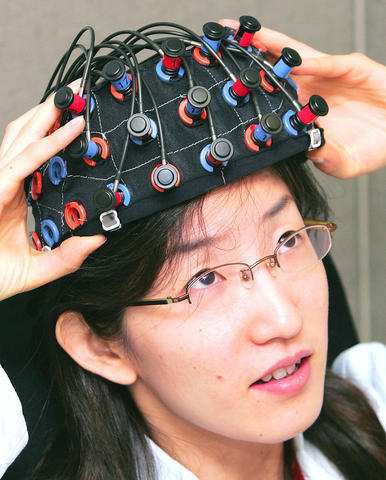Forget the TV remote: A new technology in Japan could let you control electronic devices without lifting a finger simply by reading brain activity.
The "brain-machine interface" developed by Hitachi Inc analyzes slight changes in the brain's blood flow and translates brain motion into electric signals.
A cap connects by optical fibers to a mapping device, which links, in turn, to a toy train set via a control computer and motor during one recent demonstration at Hitachi's Advanced Research Laboratory in Hatoyama, just outside Tokyo.

PHOTO: AP
"Take a deep breath and relax," said Kei Utsugi, a researcher.
At his prompting, I did simple calculations in my head, and the train sprang forward -- apparently indicating activity in the brain's frontal cortex, which handles problem solving.
Activating that region of the brain -- by doing sums or singing a song -- is what makes the train run, according to Utsugi. When I then stopped the calculations, the train stopped, too.
Underlying the brain-machine interface is a technology called optical topography, which sends a small amount of infrared light through the brain's surface to map out changes in blood flow.
Although brain-machine interface technology has traditionally focused on medical uses, makers like Hitachi and Japanese automaker Honda Motor Co have been racing to refine the technology for commercial application.
Hitachi's scientists are set to develop a brain TV remote controller letting users turn a TV on and off or switch channels by only thinking.
Honda, whose interface monitors the brain with a magnetic resonance imaging (MRI) machine like those used in hospitals, is keen to apply the interface to intelligent, next-generation automobiles.
The technology could one day replace remote controls and keyboards and perhaps help disabled people operate electric wheelchairs, beds or artificial limbs.
Initial uses would be helping people with paralyzing diseases communicate even after they have lost all control of their muscles.
Since 2005, Hitachi has sold a device based on optical topography that monitors brain activity in paralyzed patients so they can answer simple questions -- for example, by doing mental calculations to indicate "yes" or thinking of nothing in particular to indicate "no."
"We are thinking various kinds of applications," project leader Hideaki Koizumi said. "Locked-in patients can speak to other people by using this kind of brain machine interface."
A key advantage to Hitachi's technology is that sensors don't have to physically enter the brain. Earlier technologies developed by US companies like Neural Signals Inc required implanting a chip under the skull.
Still, major stumbling blocks remain.
Size is one issue, though Hitachi has developed a prototype compact headband and mapping machine that together weigh only about 1kg.
Another would be to tweak the interface to more accurately pick up on the correct signals while ignoring background brain activity.
Any brain-machine interface device for widespread use would be "a little further down the road," Koizumi said.
He added, however, that the technology is entertaining in itself and could easily be applied to toys.
"It's really fun to move a model train just by thinking," he said.

The Ministry of Foreign Affairs (MOFA) yesterday said it is closely monitoring developments in Venezuela, and would continue to cooperate with democratic allies and work together for regional and global security, stability, and prosperity. The remarks came after the US on Saturday launched a series of airstrikes in Venezuela and kidnapped Venezuelan President Nicolas Maduro, who was later flown to New York along with his wife. The pair face US charges related to drug trafficking and alleged cooperation with gangs designated as terrorist organizations. Maduro has denied the allegations. The ministry said that it is closely monitoring the political and economic situation

UNRELENTING: China attempted cyberattacks on Taiwan’s critical infrastructure 2.63 million times per day last year, up from 1.23 million in 2023, the NSB said China’s cyberarmy has long engaged in cyberattacks against Taiwan’s critical infrastructure, employing diverse and evolving tactics, the National Security Bureau (NSB) said yesterday, adding that cyberattacks on critical energy infrastructure last year increased 10-fold compared with the previous year. The NSB yesterday released a report titled Analysis on China’s Cyber Threats to Taiwan’s Critical Infrastructure in 2025, outlining the number of cyberattacks, major tactics and hacker groups. Taiwan’s national intelligence community identified a large number of cybersecurity incidents last year, the bureau said in a statement. China’s cyberarmy last year launched an average of 2.63 million intrusion attempts per day targeting Taiwan’s critical

‘SLICING METHOD’: In the event of a blockade, the China Coast Guard would intercept Taiwanese ships while its navy would seek to deter foreign intervention China’s military drills around Taiwan this week signaled potential strategies to cut the nation off from energy supplies and foreign military assistance, a US think tank report said. The Chinese People’s Liberation Army (PLA) conducted what it called “Justice Mission 2025” exercises from Monday to Tuesday in five maritime zones and airspace around Taiwan, calling them a warning to “Taiwanese independence” forces. In a report released on Wednesday, the Institute for the Study of War said the exercises effectively simulated blocking shipping routes to major port cities, including Kaohsiung, Keelung and Hualien. Taiwan would be highly vulnerable under such a blockade, because it

Conflict with Taiwan could leave China with “massive economic disruption, catastrophic military losses, significant social unrest, and devastating sanctions,” a US think tank said in a report released on Monday. The German Marshall Fund released a report titled If China Attacks Taiwan: The Consequences for China of “Minor Conflict” and “Major War” Scenarios. The report details the “massive” economic, military, social and international costs to China in the event of a minor conflict or major war with Taiwan, estimating that the Chinese People’s Liberation Army (PLA) could sustain losses of more than half of its active-duty ground forces, including 100,000 troops. Understanding Chinese